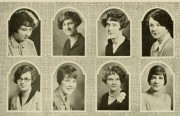Life is full of triggers. I can’t always predict when something will happen that will spark sensory memories or casual remarks or images can send me into a spiral of teenage insecurity. Most people deal with those as best they can. Of course, some have better coping mechanisms than others, but perhaps that’s what Life is trying to teach us.
Imagine my surprise when my friend Nemo Flagrank brought the New York Times ![]() article called “Literary Canons Could Make Students Squirm” to my attention. Apparently, some students are requesting that academic institutions, as a matter of policy, put disclaimers on class material that might be graphic or otherwise difficult to watch, read about, or listen to. Images that might trigger their sadness, frustration or insecurity.
article called “Literary Canons Could Make Students Squirm” to my attention. Apparently, some students are requesting that academic institutions, as a matter of policy, put disclaimers on class material that might be graphic or otherwise difficult to watch, read about, or listen to. Images that might trigger their sadness, frustration or insecurity.
On the surface, that seems a reasonable request, but in a political environment that has pitted Progressives against Regressives, it shelters a very steep slippery slope. Too easily, “trigger warnings” can be interpreted as get-out-of-class-free cards or, worse, a portent of curriculum censorship.
Too many boomers are mourning the loss of portions of our childhood which were sublime and healthy: safe streets, long, clear-aired summers, curricula unfettered by financial concerns, and, for many of us, reasonable teachers. The problem is not everyone experienced those tastes of utopia. It was a world of open racism that rebounded in years of anger and violence. Years that introduced “Political Correctness,” a good concept, flawed in practice. Awareness of others’ feelings can be very healing; seeing hateful intent everywhere can be very harmful.
For example, Mark Twain’s Huckleberry Finn has been criticized and, in some places expurgated, for his “White Man’s” portrayal of the Slave Jim and other people of color. During the era of first change in mid-1900 America, this view was a painful reminder not just of the introduction of slaves to the US and the indignation the slaves suffered, but of the obstacles minorities still faced. However, Mark Twain considered slavery an abomination. He wrote extensively, in essay and fiction, about human rights.
expurgated, for his “White Man’s” portrayal of the Slave Jim and other people of color. During the era of first change in mid-1900 America, this view was a painful reminder not just of the introduction of slaves to the US and the indignation the slaves suffered, but of the obstacles minorities still faced. However, Mark Twain considered slavery an abomination. He wrote extensively, in essay and fiction, about human rights.

L Roma Evicted R Aleppo Refugees
In 2014, it’s still not easy for minorities who endure the evils born of hate, and here, regardless of laws passed to equalize the playing field not only for minorities in general, but for women as well. Despite the positive changes to our still-flawed society, reminders of where we started both as communities and individuals, can be painful, triggering emotions we’d rather not feel. Is it any less painful to have lived in an abusive household than to have tried to live in a community that made no place for you? I don’t know. I doubt there’s even any answer.
As I read “Literary Canons Could Make Students Squirm” I was reminded of a movie with Joan Crawford called “Goodbye My Fancy” (1951.) In it, Crawford plays a congresswoman invited back to the “all-girl” college from which she’d been expelled to make the commencement address and show a film she’s commissioned about state-sponsored bullies. The atmosphere on that campus is very much at odds with what’s happening on real campuses today. In the film, the college board has been systematically stripping the curriculum of anything that might make the female students think (“a dangerous activity for any female”) or feel unsafe in the world (they will, after all, have husbands to protect them.) Yet the students take issue with that process. Crawford’s character remembers the compliant college president as a young, spirited professor who excoriated what he called the “educaterers,” the very people to whom he is bending in his post-war academic community.

Intrepid Women
What a difference 60 years make. When educating females beyond high school was still a privilege rather than a right, I suppose women students had to be more intrepid. They were the pioneers rather than the propagandized. Today’s children are bombarded with messages that education, sports, and show business are the only roads out of poverty or familial prisons, and there is certainly truth in those messages.
Even if it were possible to be “safe” from the unexpected, what a boring, and possibly unfulfilling life that would be. Hiding from negative emotion may or may not prevent further hurt. Even if it does, that level of openness would also protect those who hide from the positive experiences that could, bit by bit, overcome the negatives.
No disrespect to the students who’ve asked for warnings, but Life is full of triggers and I was told college was meant to help prepare you to live in the practical world. Sometimes it does. Sometimes it doesn’t. Either way, cringing from what the literature may reflect strengthens neither our resolve nor the mechanisms we could building to help us face Life.


Well said, Judy. I read the same “Times” article with the same response. If we removed enough triggers from the pages of important books (starting earlier than the Bible, but including it because of its references to slavery), our libraries would be filled with blanked-page books.
And that would be the least of our problems.